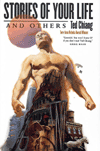| Ted Chiang Stories of Your Life and Others Four and One-half out of Five blings 
Buy this
Book | Two Nebula awards, a Hugo, the John W. Campbell for Best New Writer, a Sturgeon, a Sidewise, a Locus, an Asimov's Readers' Poll, all in the span of a decade for an oeuvre that amounts to less than 10 stories. Makes for an impressive list of accomplishments, doesn't it? Sure, and it's likely I missed one or two others. However, what's impressive is the stories that garnered these speculative fiction honors are all in one great fiction collection, Stories of Your Life and Others by Ted Chiang, published in hardcover by Tor this past July. | Chiang burst onto the science fiction scene in 1990 with "Tower of Babylon," which appeared in the November 1990 issue of Omni. The story went on to win the Nebula Award for best novelette, and kicks off the collection with a bang, weaving a yarn described as "Babylonian science fiction" in the author notes.
You might ask what does Babylonian science fiction has to do with rock, hip-hop, and fans? For that matter, what do heightened perception, mathematical equations, the creative power of language, and angels, heaven, and hell as real, natural phenomena have to do with anything fans care about? Well, each story offers a viewpoint readers probably didn't consider (or even imagine) before, an alternative way to look at the world. Start with "Tower of Babylon" as an example. The story describes the tower in simple terms, so high it would take someone two days to walk its length were it laid out along the ground, so tall it takes four months to cart bricks from the ground to the top. It's a description worthy of the scale of the Babylonian undertaking, which is to reach the vault of heaven and dig through to God. A miner named Hillalum, hired by the Babylonian, communicates the story theme with the understanding of an engineer and the bafflement of someone privileged with a glimpse of mysteries. It isn't often a writer evokes an idea that makes logical sense but still leaves you wanting more. Even better, the stories appear in order of publication -- from "Tower of Babylon" through the recent Hugo winner "Hell Is the Absence of God" and finishing with the new "Liking What You See: A Documentary" -- offering a chance to see Chiang's skill and ambition grow with each story. "Division by Zero" is a good measure of that change. The story interchanges scenes that explain mathematical equations in with ones about Renee and Carl, and the attempts they make at repairing their relationship after Renee's failed suicide. At the same time Chiang challenges our preconceptions about simple math, he proves that 1 + 1 = 2 when it comes to matters of the heart. My personal favorite is the previously mentioned "Hell Is the Absence of God," which I read prior to the recent World Science Fiction Convention in San Jose. This was the first year I've had the opportunity to register early for the convention and consequently nominate and vote for the Hugo Awards. "Hell" weighed in against four other excellent novelette nominees -- "Undone" by James Patrick Kelly, "The Days Between" by Allen Steele, "Lobsters" by Charles Stross, and "The Return of Spring" by Shane Tourtellotte. Initially, I wasn't impressed with the style Chiang had selected. Rather than use a more conventional construction, where a writer shows events as they occur, the story tells the reader about the events that shape the lives of Neil Fisk and his unassailable grief over his wife's death, Janice Reilly and her miraculous transformation, and Ethan Mead and his thirst for a holy destiny. The story tells all -- as if the narrator is omniscient and predestination has cemented these three fates in their various courses. However, the story becomes subtler the more times I read it. Instead of pushing away sympathy for the characters -- that denied the existence of free will -- the style seems a thematic statement by itself. Chiang writes in his author notes how he wanted to write about angels and the problem of innocent suffering in natural disasters (acts of God, if you will). "Hell Is the Absence of God" is a sermon, and illustrates in my opinion the freedom people find in their beliefs even when they aren't rewarded for them. What is fandom but a group of people interested in viewpoints that fall outside the mainstream? Are fans always rewarded for their interests? I'd say we're a minority, but I'd also say we're a minority that doesn't care if our virtue is left unrewarded. Ted Chiang may preach to the choir, but the message comes across like a voice in the wilderness. - Steve Nagy |